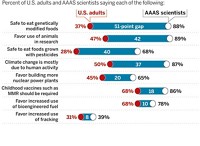Advertisement
Grab your lab coat. Let's get started
Welcome!
Welcome!
Create an account below to get 6 C&EN articles per month, receive newsletters and more - all free.
It seems this is your first time logging in online. Please enter the following information to continue.
As an ACS member you automatically get access to this site. All we need is few more details to create your reading experience.
Not you? Sign in with a different account.
Not you? Sign in with a different account.
ERROR 1
ERROR 1
ERROR 2
ERROR 2
ERROR 2
ERROR 2
ERROR 2
Password and Confirm password must match.
If you have an ACS member number, please enter it here so we can link this account to your membership. (optional)
ERROR 2
ACS values your privacy. By submitting your information, you are gaining access to C&EN and subscribing to our weekly newsletter. We use the information you provide to make your reading experience better, and we will never sell your data to third party members.
Drug Development
Concerns over social media and clinical trials
by Bibiana Campos Seijo
November 18, 2018
| A version of this story appeared in
Volume 96, Issue 46
I am concerned about the content of an article I read in Nature relating to the world of clinical trials and social media. I’m sure many of our readers working in pharma feel strongly about this, as these crucial studies are part of their day-to-day efforts and a progression of work done in the lab.
“How Facebook and Twitter Could Be the Next Disruptive Force in Clinical Trials” describes how patient groups are increasingly having greater influence on the way clinical trials are designed and run through their use of social media channels.
Before the advent of social media, individuals taking part in these kinds of studies did not necessarily know anything about other people taking part—for example, who they were and how they were responding to treatment. Enter Facebook and Twitter. Participants in trials can now gather, form networks, and organize on social media sites. The goal is to join forces, share information, and offer support, all of which have clear benefits.
But there are also unintended consequences that have the potential to damage the integrity of the trial. The story shares, for example, how the mother of a boy with Duchenne muscular dystrophy heard via Facebook that the trial her son was participating in had been stopped. A failed trial is no doubt upsetting, but finding out this way must have made it even more difficult. And it gets worse: Individuals in those forums openly discuss side effects or the lack thereof, leading participants and their families to speculate on who is receiving the placebo. This practice could result in inadvertent “unblinding” of the study and lead individuals to make the decision to stop participating, affecting its outcome.
I understand how we got into this situation. People are desperate to find treatments for diseases affecting themselves and their loved ones. But from the point of view of the researchers running trials, it’s a big problem. This practice has the potential to compromise the results of trials, weakening their findings.
What’s to be done? One option is to insert a clause in the documents that people are asked to sign before their participation with language that prevents them from sharing data or information about the trial online. This approach seems heavy handed. Another option is to allow patients and families to be part of a moderated group in which they are steered away from sharing data that may compromise the integrity of the study. Patients, however, could oppose an intervention that compromises their privacy.
Related to clinical trials, the Science & Technology Committee appointed by the U.K. government to advise on clinical trials in relation to research integrity released a reportin October asking—yet again—for greater transparency.
The problem is old and known. Around half of clinical trial results go unreported, even when the European Commission has required since July 2014 that all trials recorded in the EU Clinical Trial Register have their results submitted within one year of completion. The need for clinical trial transparency is critical, but compliance is poor. (Pharma companies are not the worst offenders, in case you are wondering.)
Advertisement
Trials are large, expensive research projects used to generate knowledge that is used in clinical practice to make vital decisions. Luckily, the problem is not fraud but incomplete or inaccurate reporting. Regardless, not reporting is a waste of money and distorts the evidence underpinning medical practice.
So what should the modern clinical trial look like? Is there a role for social networks? Their evolution, whether driven by patients’ use of technology or by the need for transparency, is necessary to retain public trust in science and medicine.
Views expressed on this page are those of the author and not necessarily those of ACS.




Join the conversation
Contact the reporter
Submit a Letter to the Editor for publication
Engage with us on Twitter